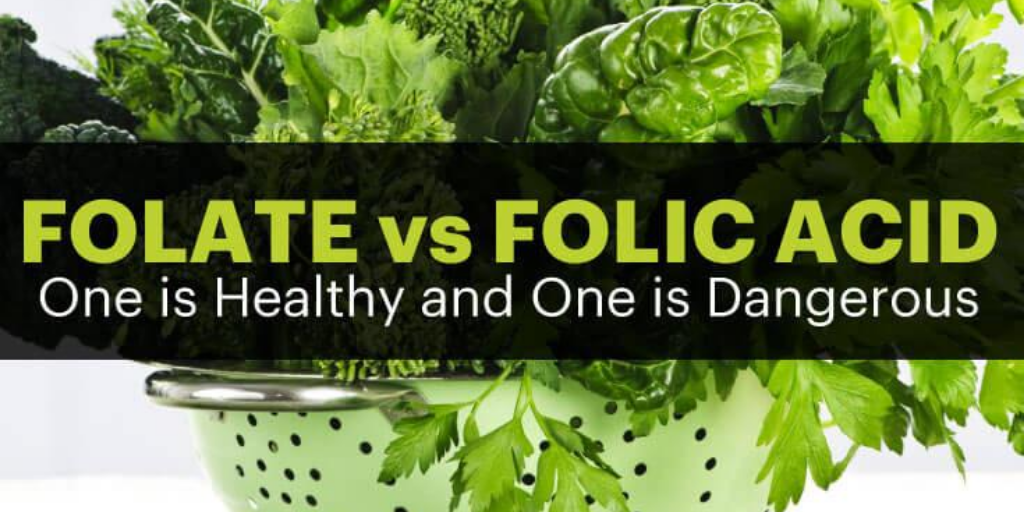Folate for Chronically Ill People
What you should know about folic acid in your multivitamin.

Folic acid is a common supplement we see in stores and is often recommended for pregnancy and different health concerns. However, when we take drugstore folic acid, either as a standalone or in a multivitamin, we are not doing ourselves any favors. Folic acid is an oxidized form and must be converted by the body to the reduced form of folate. The body doesn’t know what to do with the synthetic form and you could be blocking your cell’s receptor sites from breaking it down into the body’s natural occurring form of folate, scientifically known as 5-methyltetrahydrofolate (or 5-MTHF for short):
folate → dihydrofolate → tetrahydrofolate → methylene tetrahydrofolate → 5-methyltetrahydrofolate
It may seem a little technical, but having a practitioner who understands this conversion, not to mention if client/person can properly make the conversion, is crucial. Some folks are unable to make the conversion because they have a specific genetic mutation, more technically known as a single nucleotide polymorphism, or SNP (pronounced “snip”).
In the very simplest genetics explanation, we know that every living person received a unique DNA makeup from his or her parents. One half of our DNA came from our mom and one half came from our dad. Along the DNA strand are alleles, which means one member of a pair. Alleles will be either negative (-) or positive (+), and if we received two positive alleles (+/+) on the SNP known as C677T, then we have the most severe mutation and a decreased ability to convert folate to 5-MTHF.
About 40 percent of the population, myself included, has a mutation on this SNP (C677T) [1]. And while a person could have zero symptoms at all, they could also have increased homocysteine (an amino acid that can cause heart disease when present in large quantities), progressive neurological disorders, cancer, or pro-inflammatory immune reaction resulting in hundreds of disorders. Moreover, folate is essential for vitamin B12 metabolism as well as in the functioning of the central nervous system and the immune system, creating an impaired ability to detox.
We have had these mutations on our SNPs since the beginning of man, however, we live in a very toxic world and the body’s ability to rid itself of the toxins we encounter daily is crucial for health and wellbeing. Consider the facts of toxins in our immediate world for one minute:
- Nearly 80,000 new synthetic chemicals have been released into the environment [2].
- Hundreds of different pesticides are used on the food we eat.
- Roughly 287 known harmful substances can be found in most blood samples [3].
- The average home contains 3 -10 gallons of hazardous materials [4].
- In the U.S. alone, over 1 billion pounds of pesticides are used every year [5].
- There are at least 5,000 chemical ingredients in cosmetics [6].
- Prescription medications are now showing up in our water supply [7]. And, to add insult to injury, certain medications referred to as “drug muggers” actually steal Vitamin B9/Folate from the body [8].
These staggering toxicity exposure statics, coupled with the fact that over a third of the world’s population lacks the ability to adequately convert Folate to 5 MTHF, have set us up for a perfect storm for increased chance of major illness.
Discovering if you have a SNP mutation is easy. It also arms you with the knowledge of what you need to do to get and stay healthy in our ever-increasing world of toxicity. I offer a 20-minute Health Discovery Session
for $49 to help you find the right course of action to take charge of your health today.
https://rarediseases.info.nih.gov/diseases/10953/mthfr-gene-mutation
https://www.ncbi.nlm.nih.gov/pubmed/18991917
https://www.ewg.org/research/body-burden-pollution-newborns/detailed-findings
https://bouldercolorado.gov/sustainability/hazardous-materials-management-facility-hmmf
https://www.ncbi.nlm.nih.gov/pmc/articles/PMC2946087/
https://www.ewg.org/skindeep/why-this-matters-cosmetics-and-your-health/
https://www.pbs.org/wgbh/nova/article/pharmaceuticals-in-the-water/
https://www.marconews.com/story/life/2018/05/28/ask-pharmacist-pain-killers-and-drug-mugging/642229002/
Don't Miss Out On More!

Heidi Toy FNTP
I help people all over the world heal by identifying and treating the root cause of their body imbalances. Through diet and nutrition, I guide them towards wholeness and balanced lives.
Heidi Toy Functional Medicine Blog

For many of us, our experience with food comes with some sort of baggage. Maybe you eat to cope with stress, anxiety or depression. Maybe you’ve grown up with value-words placed on food such as “junk” and “healthy,” and told you couldn’t eat the “good stuff” (brownies and ice cream) until you finished the “yucky stuff” (broccoli and lettuce). Or, even more serious, maybe you or a loved one has struggled or is struggling with an eating disorder. Food is amazing and life-giving. It can be used as a means to celebrate, socialize, or simply just provide fuel for the body. Our relationship with food shouldn’t be a difficult one, it should be an enjoyable one. A way to get to that healthy place in your relationship is to practice mindful eating. Mindfulness is a Buddhist concept of mediation that can help you recognize emotions and physical sensations present. Through mindful eating, you can learn to truly pay attention to your experiences, cravings and physical cues. The basics of mindful eating are: Eat slowly, without distraction. If you are eating with others, take a least five minutes at the start of the meal to enjoy the food on your plate before engaging in discussion. Pay attention to your body--are you still hungry, or are you getting full? Learn to distinguish between cravings and true hunger. Use all your senses when you sit down to a meal. Make an effort to notice how the food looks, smells, tastes, feels in your mouth, and sounds when you chew. Appreciate your food, who has prepared it (even if it’s you--what an accomplishment!), and where it comes from. Being mindful of your experience will help you slow down while eating. This can prevent overindulgence by making the act of eating intentional instead of automatic. It will also help you become aware of triggers that make you want to eat (are you truly hungry at 9pm every night when you sit down to watch that Netflix show, or do you just pour yourself a bowl of Chex Mix because that’s what you always do?). Knowing your triggers can give you time to process what’s truly going on and the ability to react properly.

Here are the essential functional medicine steps for Fifth Disease! If your child comes home with bright red cheeks that look like they’ve been “slapped,” chances are they may have fifth disease, also known as erythema infectiosum. This mild viral illness, caused by parvovirus B19, is common in kids and often spreads t

Successfully healing Adrenal Fatigue requires a holistic approach focussed on fixing the root cause of your problems and supporting your body through the healing process. This means we are going beyond just temporary symptom relief. We want you to return to vibrant health so you can get back to the active and healthy lifestyle that Adrenal Fatigue is holding you back from. (Adrenal Fatigue is more accurately known as HPA-D. Check out my blog HPA-D vs Adrenal Fatigue to learn more.)Again, we would be completing further testing to get to the root cause of your issues, but this protocol is a great starting point for healing. We focus on five essential areas for fast and long-term healing.

I want it! Sooooooo bad. But I want to lose weight, too. It’s not on my list of healthy, squeaky clean healing foods, but what will one little bite hurt? I can start again fresh and clean tomorrow. When brownies call your name and you are trying to break up with them, it is difficult to avoid the urge to want to indulge. But you know if you give in that you will berate yourself with guilt for the next 24-48 hours and the tsunami of eating everything off-plan will take over your life. One bite will start an avalanche... But you just can't stop thinking about the pan of brownies you made for the kids.

Did you know most people didn’t have refrigerators in their homes until well into the 1900’s? It wasn’t even invented for large scale commercial use until the mid 1800’s [1]. So how did people keep their milk cold and make their food last longer? Fermentation. It sounds like a gross concept, because we often associate fermentation with a bad odor, but foods like cheese, yogurt, sauerkraut and pickles are all fermented foods. And those aren’t gross, are they? Well, some might disagree with me about sauerkraut, but that’s beside the point. Fermented foods are digestive aids. Microscopic living organisms in fermented foods help extend the food’s shelf life, enhance flavor, and help the body absorb minerals. These organisms pre-digest the food, getting rid of harmful components, and create more vitamins and enzymes than the food began with. Enzyme-rich foods have many benefits including [2]: Increase digestibility of food we eat Boost immune system Increase alkalinity; neutralizing pH levels Provide a healthy balance of friendly flora in the gut (Learn more about your microbiome in my other blog posts ) Tone the colon and help with elimination Control cravings for unhealthier foods Eliminate toxins and undigested wastes in the body In the “old days,” people use to ferment all kinds of foods through pickling, canning, pasteurization and added salt. Nowadays, however, large scale fermentation has lost many of its nutritious benefits due to the need for speed to get the product on the shelf as fast as possible and as cheap as possible. The only true fermented foods you will find are sauerkraut, kombucha, yogurt and kefir, beans, wine and beer, some meats (such as salami and pastrami), legumes and nuts (such as tofu, soy sauce and miso), sourdough bread, and various kinds of vegetables [3]. Fun facts about sauerkraut: The Germans “stole” it from the Chinese! Sauerkraut (probably not labeled as such for the Chinese, but the same recipe) was one of the main foods for those who built the Great Wall of China. Genghis Khan brought it to Eastern Europe during an invasion. It also contains high levels of vitamin C, and sailors often took it on long journeys to prevent scurvy.

How can we best keep blood sugar stable? Do what our body is designed to do – use fat for energy. Our species did not survive the Ice Age because of vanilla coffee lattes and cheesecake. Throughout most of our history, we ate a diet that was likely 50-70 percent fat. Look at the old family photo albums, specifically pictures of people in the first half of the 1900s, before we had so many processed foods. You won’t see many fat people--in fact, most look darn skinny. If they lived on the farm, they ate lots of eggs, meat, milk, and vegetables out of their own backyards. “Diet foods” were non-existent. Heart disease was almost non-existent. Our metabolism is designed to work much better with fats better than with sugar. Fats provide the slow and steady fuel our body likes to use for energy. Think of fats as a slow-burning log on the fire. One log (i.e. one meal containing fats) lasts for hours. Starchy carbs, on the flip side, are like kindling. You constantly have to throw more twigs (chips, pasta, bagels) to keep the fire burning. The first step is to know your sugars by reading the labels, and then avoid said sugars as much as possible.









































































































